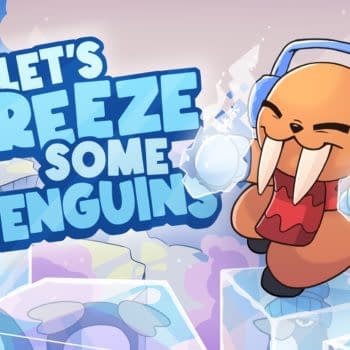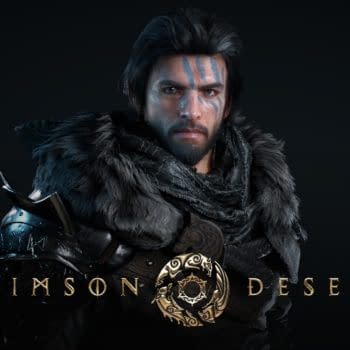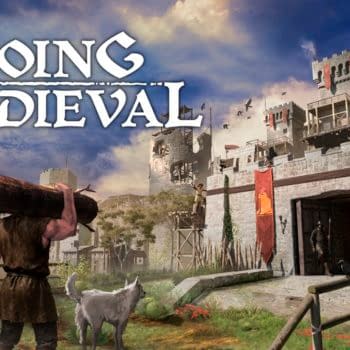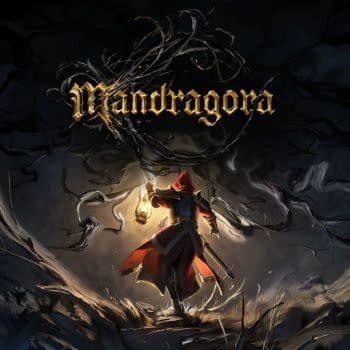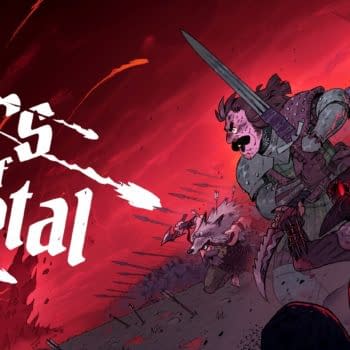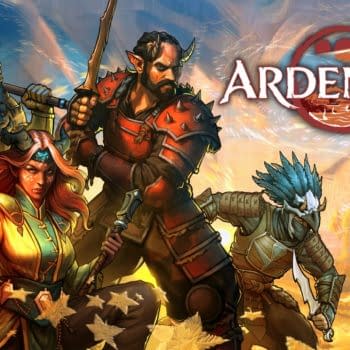Posted in: Games, Let's Play, Video Games, YouTube | Tagged: Ad-Pocalypse, Adam Kovic, Bruce Greene, Chilled Chaos, Funhaus, Hutch, Let's Players, lets play, Rooster Teeth, Seananners, youtube
YouTube's Ad-Pocalypse: Analyzing The Aftermath On Let's Players
Back in April of this year, YouTube collectively gave millions of content creators a collective heart attack at once by running no ads on their service for almost a solid month. This meant that some creators who had monetized their videos saw no share of the advertising income that had allowed them to profit from the work they were doing on the online video platform. To call the entire ordeal chaotic would be an understatement as thousands who were creating daily video content as their careers suddenly found themselves in a bad way with no outlet to make money on.
One of the biggest groups to get hit during this period were Let's Players, who make it their daily careers to play videos games and edit the footage up to create videos for fun and humorous purposes. Many people chimed in on this via Twitter and Facebook, even making videos of what was going on with them and the situation in general, with the vast majority bashing YouTube for essentially shutting down the bank on them for no reason with little contact.
In May, the issue was resolved, but still left some residual effects on many who continue to create content. Today, we're going to chat with several individuals from the Let's Play community to discuss where things had been prior, what was going on during the "Ad-Pocalypse", and where they currently stand today. These people include Bruce Greene and Adam Kovic from the Rooster Teeth-owned channel Funhaus, Shaun "Hutch" Hutchinson, and Anthony "Chilled Chaos".
For the record: We contacted YouTube directly several times to get their take on the situation and feedback on what these guests said, to which the company did not respond to multiple interview requests. If they wish to comment back on this piece, the door is open!
To bring in a little context to the discussion, you have to go back to February and March, when the Wall Street Journal ran pieces on PewDiePie (Felix X), which you can read our own coverage and opinion on the situation here. In light of these stories, advertisers starting pulling their ads from YouTube, the first notable one being AT&T with more following. The consensus seems to be that these stories are what put the events in motion.

"I think if you're someone who is casual watching, you may conflate it with what happened with PewDiePie and hate speech,' says Hutch. "I don't view anything he did as hate speech, but I think it was an understandable reaction from advertisers. Advertisers have a right to determine what sort of content their ads appear on, [but] I'm more surprised this problem didn't happen before. I've been waiting for something like this to happen for a long time and I wasn't too surprised when it did. But I do think it was more PewDiePie than the videos with Nazis in them with 350 views that people are getting upset about, it probably was the catalyst that started it."
YouTube has always seemed to have a rocky relationship with content creators in general. From an outside perspective, it does seem that certain creators get preferential treatment depending on how well their channel is doing. So we asked everyone what their relationship was like with YouTube prior to all of this.
"We talk to YouTube almost on a weekly basis," says Greene. "We have our own kind of rep who is fantastic who will do his best to answer questions as best he can. When these bigger questions come up that they may not have an answer for, they still talk to us, and they give us their best-educated guess for us and tell us different things to try. But we have had contact with YouTube and they've been very helpful with us."
Chilled on the other hand has a different scenario, as he explained, "I don't have a dedicated YouTube person to go to per se. I'm with a network, Three Black Dot, and they're usually the middle-man for a lot of the dealings I'll have. I used to know a couple of the people who worked at YouTube people, but like any internet job, turnover is real fast. So for the most part if I have an issue I may tweet about it and someone that works at YouTube will get back to me, but I don't have a direct contact."
Meanwhile, Hutch has built a relationship with the channel over time, being one of the longest running creators in the genre.
"I have some contacts at YouTube that I can open a line of communication with pretty easily. But I've been working in this industry for eight or nine years, so my case probably isn't the standard. Sometimes it's hard to get definitive answers, sometimes it takes them a day or two to get back to me, and sometimes they don't have a solution to the problem. Your experience and response with YouTube is going to vary a lot depending on where you're at and who you know and how big your channel is."

We then asked everyone how they were doing with their respective channels. While the results varied, it seems as if everyone was in a good place with few complaints. Funhaus seemed to be doing the best of the three as they were experiencing a steady trend after two years of growth.
"Great! In terms of revenue, we were absolutely on the rise," commented Greene. Funhaus continued to receive some income via YouTube Red, as did many of the major YouTube channels being a part of the service, but it was a much smaller percentage compared to what they were normally making. Hutch seemed to be doing well himself in a different respect.
"My views had actually plateaued but my monetization was going up before that happened. So as far as the ad rates and the CPM, they were on the rise."
Other content creators were not as fortunate but didn't see any major issues.
"For myself, the channel has been stable for about three years," says Chilled. "I hit about ten million views a month, which is great. But prior to the issues in March and April, it was on the rise, which was great. The channel view-wise was about normal, I would say my channel is maturity phase where it's not super growthy, it's just keeping what it has and being consistent. But ad revenue was pretty good, no complaints there."

All of the people we chatted with for this piece were already in contact with each other and figured out that perhaps if the thumbnail and the titles were suggestive, that might have leant credence to having their ads removed. Even YouTube suggested that anything of questionable content might fall into this field. But Funhaus quickly discovered videos that were perfectly clean we also pinged.
"We had seen reports coming from our other friends on YouTube who were saying some of their videos were getting demonetized, that's where the dollar sign on YouTube goes from green to yellow. And I was like 'Yeah, we're not getting hit, that's really weird.' Then all of a sudden it just dropped, the bottom dropped out and we went from everything was fine and monetized to YouTube was no longer running ads on our channel. But what was weird about that was we didn't get the yellow dollar sign, so we didn't get the notification the video was demonetized. They just stopped running ads," said Greene.
For individual creators, the discovery was a bit more sudden and disturbing.
"As part of the Derp Crew, we were all just kind of looking at each other's numbers and trying to figure out what happened," said Chilled. "I think when there's a huge change overnight, you're not necessarily sure if it's something you did or if it's something that happened on the other side of the spectrum. We as a group didn't do anything collectively different, sow e figured it was something on YouTube or the advertiser's end, and that YouTube ad-boycott was going on so we attributed it mostly to that. It was kinda two fold: It was the boycott and then YouTube's reaction to the boycott."
"The first week was pretty brutal, it was between 30-40% of what I had been making the month before with comparable numbers. I was stressed, but I also put in a lot of work over the past few years to not put all my eggs in the YouTube basket, so my income comes from several different streams, it's not just YouTube. So while it was a little bit of a gut punch I'm fortunate enough to have things to fall back on. So it wasn't like a deathblow or anything like that," says Hutch.

Now keep in mind that these are channels that create daily content. They have turned their passion and skills and something they love into their jobs. While they may have fun gaming, they are doing so with the purpose of recording, editing, and uploading videos so they can continue to be paid doing it. Many of these creators continued making work after the ads stopped running, so we were curious if any of them thought about slowing down on making videos until the situation was resolved. Funhaus stuck to their guns.
"As a group, we talked about it and weighed our options and came to the same consensus that we could slow things down but that might end up hurting us in the long run," says Kovic. "We've been playing the YouTube game so long that we know this stuff would usually come back around, but it definitely opened our eyes to our own folly which is that we became far too dependent on a platform we don't own."
Hutch, on the other hand, didn't really become too concerned with it as he continued to do what he did. "A big reason why I didn't freak out about this is because we've had several scares like this before. The last time we had something like this was SOPA, and there have been several times where they thought something could kill YouTube. Like it was a perceived reality. And then we've had changes in the platform or proposed pieces of legislation that would have affected streamers. So I've gotten used to not believing the sky is falling until it's falling—that's not to say I don't look for warning signs of disruption in this field with its history, but I don't sit here thinking this is the end."

So YouTube creators actually changed what they were doing entirely. A good example of this was Adam "Seananners" Montoya, who stopped creating videos all together and went full live-stream mode. Alternating between doing streams on YouTube Live and Twitch. (We attempted to have Seananners join the conversation but he did not respond. It should be noted that he has returned to making edited content through YouTube on a limited basis.) So we were curious if any of the people we chatted with had thought about doing the same thing.
"I didn't really think too much to going to Twitch," said Chilled. "I like YouTube, I like the setup, I like the formula, I like that I can create something and craft it the way I want it to be, and I upload it and the audience consumes it that way. The aspect of going live is a bit frightening for me because anything can happen and something could go catastrophically wrong and you look like an idiot. I built an audience around YouTube in a certain type of style, and I'd feel bad if that wasn't what I was providing."
Hutch has already been switching between Twitch streams and using that content for YouTube videos, to which he had a different perspective. "I think if anything it made Twitch excited. They saw YouTube as sort of dropping the ball on this one particular thing. YouTube's failures could be seen as Twitch's successes in some ways. I'm sure people in the Twitch offices for the first three weeks, if I had to guess, I'd say the morale was really high over there. Like 'okay, now's the time to step in and give creators more tools and see what we can do.' If anything it probably benefited them more as people were coming in and donating more to offset the CPM's.

"Yeah, we thought about it, but that's not really our content," commented Greene on the Funhaus product. "We're not streamers, we do that kind of stuff on our own but it's not something Funhaus as a group does. We see ourselves more as a comedy channel, but as far as a Twitch kind of stream it's nothing like that at all. So we thought about it a little bit but not much. Plus, we're owned by Rooster Teeth, we're Rooster Teeth employees, so that's the offsetting cost of creating the content that we do."
By the end of April and early May, ads had returned to YouTube, but everyone was seeing a significant change in what the return was compared to where they were before.
"There's a difference, it's lower. But it's not painfully lower where we'd have to start reevaluating how we operate our business if in a year's time it stays at the same level or goes down a little bit," says Greene. "Where we were [compared to] where we are now is different, but there are a lot of different factors, too. Like, ads on YouTube are sometimes seasonal, so it may not even be us taking a hit because of demonetization. We obviously took a hit over the month they were doing that, but the ads are back, which is great, but the hit may or may not be because of what happened. It may be because it was a seasonal ad. So it's like Adam said, it's a platform we don't own, so the way they sell ads… we have no idea."
Chilled saw the same trend, commenting that "I'd say it's about 75% of what it was prior to the whole 'debacle.' But you know that when going into this line of work it's going to be a weird one. That's the problem that a lot of people don't understand—this is a very interesting and strange job. There are no set rules with YouTube and Twitch, we are writing the book as we go along. So when you take a 25% hit, you can't point to X, Y, and Z and say 'it didn't happen there!' We're on the forefront of online content creation and ad revenue. So I say it's fine in the sense that for me at least, it won't bankrupt me, but there's no alternative."

However, Hutch seemed to come out pretty lucky as he said "It's probably about where it was before. Like I said, the ad rates for me were going it, so it might be a little bit less. But my ad rates are pretty standard for where they have been."
Looking at the damage done, Kovic noted that this kind of situation can mess with companies on a bigger level.
"The big problem is something like that really messes with your trajectory when you're a growing business and you have your goals and then you take a huge hit like this. So now we're kinda in recovery mode. It's like in football when you get the wind knocked out of you when you're on a winning streak. We were depending a little too much on something for our goals and trajectory, on something we didn't own that is constantly fluctuating. And if it went away tomorrow we'd still be okay, but it's not going to get us where we need to go so it's definitely got us thinking about other options."
Now that everything has died down and YouTube has returned to being somewhat normal, everyone seems to have their own plans as to where they're going and what they'll be doing. Funhaus is currently focused on creating their usual content, as well as exclusive content for Rooster Teeth's subscription service. Such as "Haus Of Pain" which was a one-off documentary focused on James Willems and Lawrence Sonntag training to be professional wrestlers within a week, or creating unique content for their channel such as their "Talking Stalkings" episodes created more for fun without any gaming-specific content.

"We have plenty of options. We're with Rooster Teeth, there are other forms of revenue streams we can use to our advantage. If we were an independent business, which is the way it is with other YouTube creators if this happens again and they mess with their own business, like I don't know what [they'd do]—it sucks. That can be super scary if you're in business on your own, thankfully we're employees of a company that supports you when you're down," said Greene.
Kovic gave credit to the Rooster Teeth team helping them out cumulatively, saying "We also have a terrific sales team who daily are giving us ad opportunities on top of stuff like Dude Soup and Filmhaus. It's really awesome that we have this team of dedicated sales people working in Austin handling our sales."

Chilled is one of the lucky few where things have stabilized and is back on course to keeping his channel active with different kinds of games. But at the same time, he's going to keep an eye on YouTube and wishes the company would be more transparent and trusting toward those who use their service and bring in viewers daily.
"For me, it will be a trust exercise. Can we get more answers to questions before it happens again? Can you help us make our videos more advertiser friendly? Can you tell us exactly what it is we're doing wrong so we don't repeat it? We all want YouTube and its creators to be successful, we just need the tools to know how to do it."

As for Hutch, he also continues to stream and create videos for YouTube, but has taken more of a "come what may" approach to the future with a platform he doesn't control, while tackling things he can. And advises anyone still hurt or affected by the "Ad-Poclypse" to turn their focus inward so they aren't as reliant on it.
"I think the best approach is to focus on the things you can control, and think of things in terms of the long term and not the short term. If you're not where you want to be in terms of ad rates or viewers or subscribers or whatever, try to work out a new formula and where you want to be in two or four months. I think a lot of people put a lot of pressure on themselves to turn something around tomorrow or the next day and I think that's a quick way to make sure you go insane."







